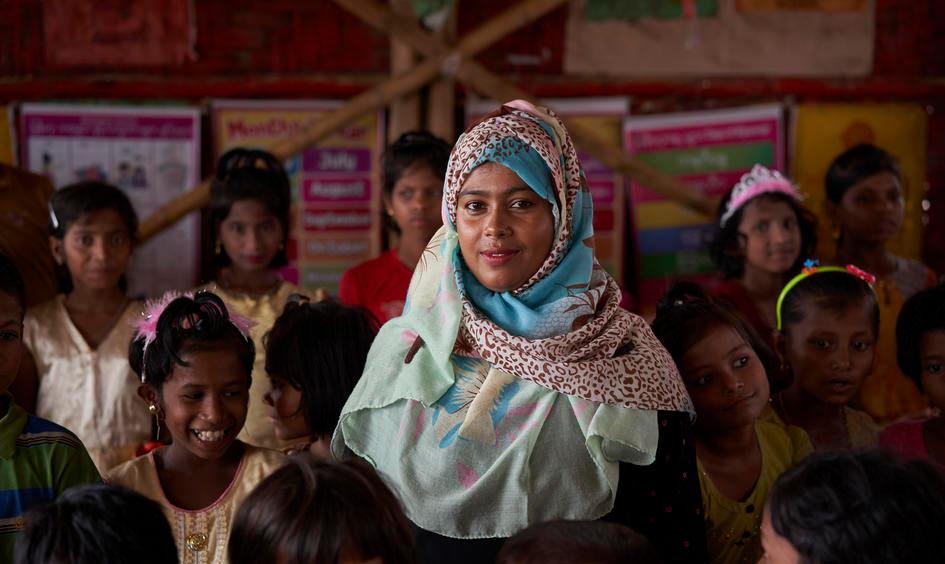Contact details
Submitted by:
- Raffaella Greco Tonegutti, Migration and Development Expert, Enabel
- Alessandra Varesco, Implementation Manager
Emails:
Website: https://open.enabel.be/fr/MAR/2282/p/empowerment-juridique-des-personnes-migrantes.html
Introduction to the project
Country
Morocco
Duration
November 2018-October 2021
Description
Enabel is implementing the project “Empowerment juridique des personnes migrantes” in coordination with the Moroccan Ministry of Justice and Delegated Ministry to the Minister of Foreign Affairs, African Cooperation and Moroccans Residing Abroad, in Charge of Moroccans Residing Abroad. This project is funded by the European Union.
Project aims
The project aims at enhancing migrants, refugees and asylum seekers’ access to rights. To achieve this objective Enabel is working with non-governmental actors, lawyers, justice personnel and universities to improve these actors’ knowledge of migrants, refugees and asylum seekers’ rights and to enhance their coordination and sharing of best practices.
Universities play a key role in migrants, refugees and asylum seekers’ access to rights through the training of next generation professionals, through researches, through analysis of social issues and, eventually, to the direct counselling of migrants that address their concerns to the law clinics and the law professionals working the migration and asylum law.
In Morocco, several universities operate law clinics. These clinics not only aim at reinforcing law students’ practice but also at encouraging students’ involvement in societal issues. The project “Empowerment juridique des personnes migrantes” cooperates with four law clinics implemented in different Moroccan regions: Casablanca, Oujda, Rabat and Tangier. These four clinics differ in their objectives and operationalization but they all aim at reinforcing migrants, refugees and asylum seekers access to their rights.
Given this Enabel established a cooperation framework between these four Moroccan universities and two Belgian universities – Université catholique de Louvain and Université libre de Bruxelles- that operate law clinics focusing on migrants, refugees and asylum seekers’ rights.
A first contact between Moroccan and Belgian universities took place in January 2019. These first discussions allowed universities to share their experiences and the challenges they face in implementing law clinics focusing on third country national rights. These exchanges allowed Enabel to shape an action plan aiming at reinforcing Moroccan law clinics through expanding research on migration, reinforcing professor and researchers’ capacities on the topic. Law students are also at the center of this action plan since several conferences on migration and refugee laws are planned as well as practical workshops.
A very interesting aspect of these exchanges between Moroccan and Belgian universities is that the experience and knowledge of both sides are taken into account. Seminars and workshops are not only built on Belgian experience but also on Moroccan experience and Belgian professors count on these exchanges to expand their knowledge on the migration phenomenon in the Maghreb region.
At the end of the project, in 2021, Moroccan law clinics will have contributed to reinforce law students’ expertise on migration and Moroccan universities will have increased research on that topic. In addition, cooperation between Moroccan and Belgian universities will be increased including by joint doctorates and joint workshops and seminars focusing on migrants, refugees and asylum seekers’ rights.
Resources used
The project “Empowerment juridique des personnes migrantes » implemented by Enabel and funded by the European union facilitate this international academic cooperation.
The project is implemented to support the Kingdom of Morocco in implementing the national strategy on immigration and asylum (Stratégie national d’immigration et d’asile - SNIA).
Main activities of the Good Practice
The activities of the project relate directly to objective 2 of the GCR: Enhance refugees self-reliance
Refugees and their lawyers (or associations protecting their rights) will have updated and complete information about their rights. This include information on how to ensure their children obtain their birth certificates and registrations. National counterparts including service providers and justice personnel will gain knowledge on refugee rights to obtain identity and other administrative documents. Lawyers and NGOs will know how to support refugees if they are denied their rights to documentation.
Partners
- Moroccan Ministry of Justice
- Moroccan Ministry Delegated Ministry to the Minister of Foreign Affairs, African Cooperation and Moroccans Residing Abroad, in Charge of Moroccans Residing Abroad
- Université Hassan II de Casablanca
- Université Mohamed I d’Oujda
- Université Mohamed V de Rabat
- Université Abelmalek Saâdi de Tanger
Challenges and how they were overcome
Challenges:
- Moroccan universities appear reluctant to allow migrants, refugees and asylum seekers in entering their campuses.
- Public universities follow ministries programs and visions; it is therefore very difficult to add or change courses. Changes in the academic area are therefore very slow and must start with informal or less formal tool, such as law clinics for example.
- Formal international academic cooperation takes a long time to be established.
Challenges are overcome by fostering dialogue among partners but also by finding alternatives allowing cooperation to happen. Adaptation of implementation strategy to allow a smoother cooperation among different actors has been required. Example: restructuring the training component to have joint training for institutional representatives and lawyers to have a more reality-based discussion on existing challenges for migrants.
These kind of adaptations are also possible because of the involvement of Moroccan and Belgian law professors who are greatly contributing to find suitable solutions to increase the knowledge base and the use of this knowledge by Moroccan relevant actors.
Results of the Good Practice
- Stronger capacities of lawyers, civil society organizations, other professionals in the field of migrants, refugees and asylum seekers’ rights.
- Structural strengthening of law clinics that will eventually give support to migrants who address their queries.
- Strengthened research on migration and asylum by Moroccan universities allowing to have more information on migration in the country/region and on target population access to rights.
Next steps
The project is ongoing until October 2021 but avenues for bilateral cooperation between universities are already explored.


